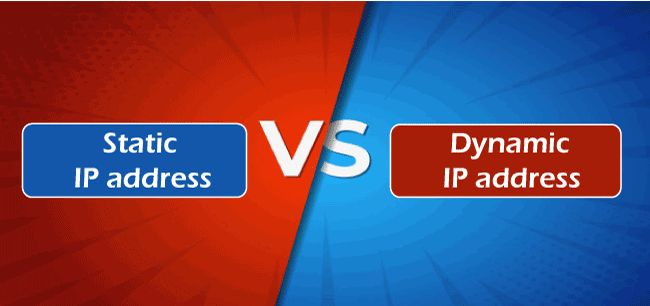Difference between Static and Dynamic IP addressA computer network comprises various devices that share data and resources like servers, desktops, routers, laptops, and switches. These devices are linked via a wired or wireless medium. Every device in a network has an address that enables it to be identified. As a result, this type of address is known as an IP address. The IP address allows network system devices to interact with one another. Furthermore, IP addresses are classified into two categories, and they are static and dynamic IP addresses. A static address is a fixed IP address that is allocated to a system device. In contrast, a dynamic address is a temporary IP address that changes frequently. In this article, you will learn about the difference between a Static IP address and a Dynamic IP address. But before discussing the differences, you must know about Static IP addresses and Dynamic IP addresses with their advantages and disadvantages. What is a Static IP Address?Static IP addresses are fixed that are manually assigned to a system device. It was the initial technique of assigning IP addresses to network devices. On the network configuration page, the network administrator manually inputs the IP address for every system. In addition, the administrator should specify data like the subnet mask and default gateway. Additionally, this process had to be carried out on all of the network's devices. As a result, it is complex to allocate the IP addresses to an extensive network of devices. Moreover, the static address is not changed until it is directly updated by the network administrator or the Internet Service Provider. Furthermore, this address does not change with each network connection. In other words, the device always connects to the internet through the same IP address. As a result, static IP addressing has numerous advantages. It provides remote access with less downtime. Furthermore, the user may access the device from any location. Advantages and Disadvantages of Static IP AddressThere are various advantages and disadvantages of a Static IP Address. Some main advantages and disadvantages of Static IP Addresses are as follows: Advantages
Disadvantages
What is a Dynamic IP Address?The dynamic IP address is typically configured on devices via the DHCP protocol and regularly updates. The dynamic IP address constantly changes whenever the user links to a network. The Dynamic Host Configuration Protocol server employs a method for tracking and retrieving IP address information associated with active network components. The mechanism utilized for translation in dynamic address is known as Domain Name Server (DNS). DNS uses the IP address and the mapped domain name to establish the specific place of the network element and send network traffic to it. The DHCP and DNS are two protocols that are widely used while accessing the internet. When a user connects to the network, DHCP assigns her a temporary dynamic IP address. When a user enters a URL into the browser's address bar, the DNS server transforms the domain name into the IP address needed for web page delivery. Advantages and Disadvantages of Dynamic IP AddressThere are various advantages and disadvantages of Dynamic IP Addresses. Some main advantages and disadvantages of Dynamic IP Address are as follows: Advantages
Disadvantages
Main Differences between Static and Dynamic IP address
Here, you will learn the main differences between Static and Dynamic IP addresses. Some main differences between Static and Dynamic IP addresses are as follows:
Head-to-head comparison between Static and Dynamic IP addressHere, you will learn the head-to-head comparisons between Static and Dynamic IP addresses. The main differences between Static and Dynamic IP addresses are as follows:
ConclusionIP addresses allow network devices to interact with one another. IP addresses are classified into two types: static and dynamic. The major difference between static and dynamic IP addresses is that static addresses are fixed addresses that are manually allocated to devices by a network administrator. On the other hand, Dynamic addresses are allocated to devices automatically by a DHCP server.
Next TopicDifference between
|
 For Videos Join Our Youtube Channel: Join Now
For Videos Join Our Youtube Channel: Join Now
Feedback
- Send your Feedback to [email protected]
Help Others, Please Share










